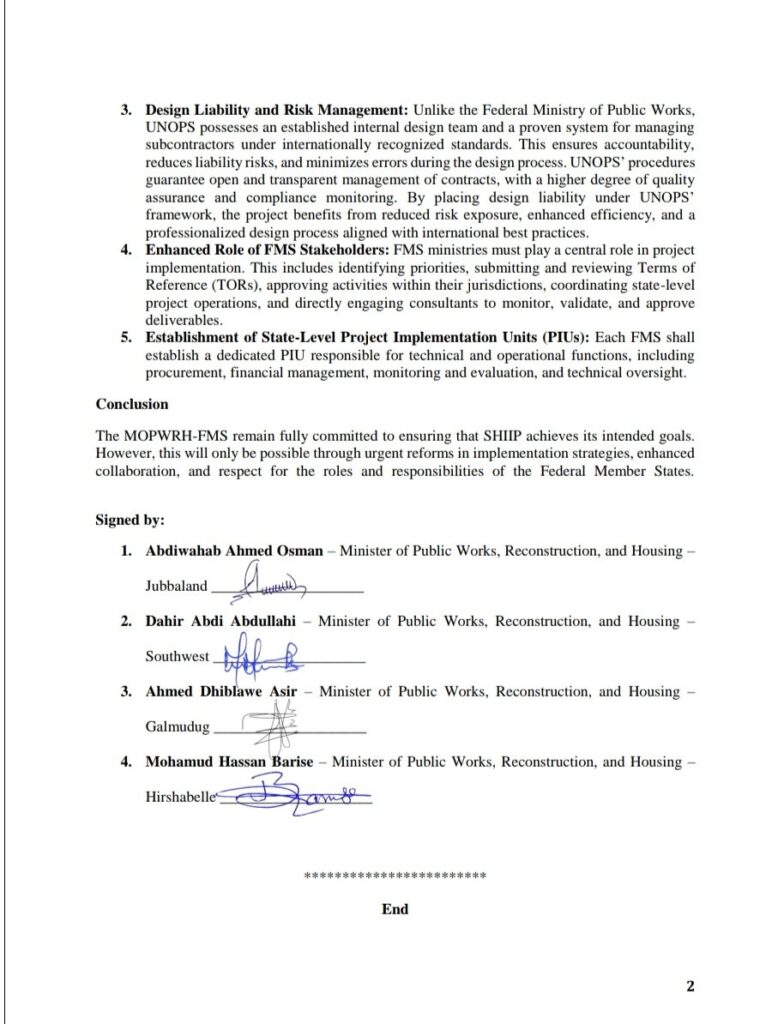The undersigned Ministers of Public Works, Reconstruction, and Housing representing Jubbaland, Southwest, Galmudug, and Hirshabelle (hereafter referred to as MOPWRH-FMS), wish to extend our sincere appreciation to the World Bank for its generous support to the Somali Horn of Africa Infrastructure Integration Project (SHIIP). This initiative is instrumental in advancing Somalia’s regional integration, economic resilience, commercial development, and transport connectivity. The project’s first phase, covering feasibility studies and detailed engineering designs for approximately 1,700 km of major economic corridors and critical bridge infrastructure represents a cornerstone for national and regional development.
Concerns Regarding Project Implementation.
During the mid-term review meeting held in Nairobi from 25 August to 4 September, stakeholders evaluated project progress, achievements, and challenges. While the discussions offered valuable insights, the meeting report regrettably failed to reflect critical concerns raised by FMS stakeholders. These include:
- The lack of clarity regarding roles and responsibilities among stakeholders.
- Absence of transparency in the procurement process for feasibility studies and engineeringdesigns.
- Exclusion of FMS institutional strengthening and capacity-building needs.
We, the Ministers of MOPWRH-FMS, express our deep concern over the prolonged delays in the implementation of SHIIP activities.
These delays stem largely from weak coordination, inadequate planning, insufficient stakeholder engagement and centralized procurement processes that lack transparency.
Alarmingly, financial reports indicate that out of the allocated USD 63 million, only 9% has been committed, despite three of the four project years having already elapsed.
Key Resolutions of the Ministers of MOPWRH-FMS.
Recognizing the urgency to safeguard the objectives of SHIIP and accelerate its implementation,
we unanimously agree on the following resolutions:
1- Engagement of UNOPS for Feasibility Studies and Designs: To prevent further delays, UNOPS should immediately be contracted to undertake the feasibility studies and detailed engineering designs. Opening a new procurement process at this stage is neither practical nor time-efficient, as only one year remains within the project’s timeframe. UNOPS has both technical expertise and contextual understanding to deliver timely results.
2- Inclusion of Capacity Building and Institutional Strengthening: The project must prioritize strengthening FMS institutions by incorporating capacity-building programs, policy and regulatory support, staffing, training, rehabilitation/construction of ministry offices, provision of essential equipment and furniture, and operational cost support.
3-Design Liability and Risk Management: Unlike the Federal Ministry of Public Works, UNOPS possesses an established internal design team and a proven system for managing subcontractors under internationally recognized standards. This ensures accountability, reduces liability risks, and minimizes errors during the design process. UNOPS’ procedures guarantee open and transparent management of contracts, with a higher degree of quality assurance and compliance monitoring. By placing design liability under UNOPS’ framework, the project benefits from reduced risk exposure, enhanced efficiency, and a professionalized design process aligned with international best practices.
4- Enhanced Role of FMS Stakeholders: FMS ministries must play a central role in project implementation. This includes identifying priorities, submitting and reviewing Terms of Reference (TORs), approving activities within their jurisdictions, coordinating state-level project operations, and directly engaging consultants to monitor, validate, and approve deliverables.
5- Establishment of State-Level Project Implementation Units (PIUs): Each FMS shall establish a dedicated PIU responsible for technical and operational functions, including procurement, financial management, monitoring and evaluation, and technical oversight.
Conclusion.
The MOPWRH-FMS remain fully committed to ensuring that SHIIP achieves its intended goals. However, this will only be possible through urgent reforms in implementation strategies, enhanced collaboration, and respect for the roles and responsibilities of the Federal Member States.
Signed by:
1- Abdiwahab Ahmed Osman – Minister of Public Works, Reconstruction, and Housing –Jubbaland
2- Dahir Abdi Abdullahi – Minister of Public Works, Reconstruction, and Housing –Southwest
3- Ahmed Dhiblawe Asir – Minister of Public Works, Reconstruction, and Housing –Galmudug
4- Mohamud Hassan Barise – Minister of Public Works, Reconstruction, and Housing –Hirshabelle.

